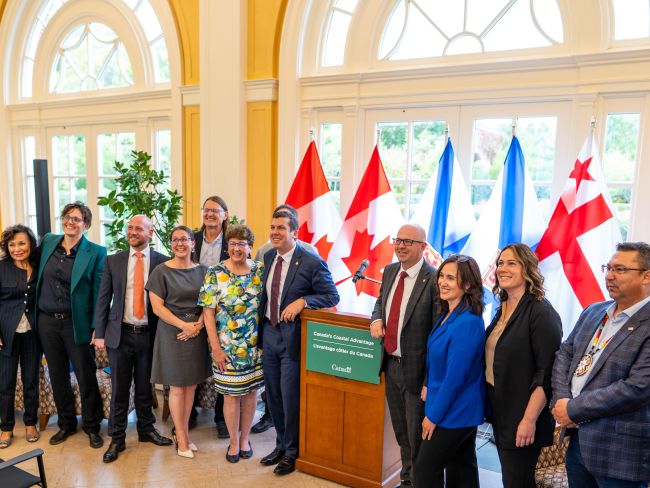Acadia’s tidal energy research gets federal funding boost

A federal funding announcement today marks a significant new chapter for tidal energy research at Acadia University.
Acadia’s leadership in tidal energy research goes back decades. It got a boost today with $2.6 million in funding from Natural Resources Canada for a three-year project to better understand the probability of fish interactions with proposed tidal stream energy devices in the Minas Passage.
At a news conference on campus today, the Honourable Kody Blois, on behalf of the Honourable Tim Hodgson, Minister of Energy and Natural Resources, and the Honourable Joanne Thompson, Minister of Fisheries, made the funding announcement.
“Research enables the tidal energy regulators and the industry to make informed decisions and to move forward with confidence,” says Dr. Jeff Hennessy, President and Vice-Chancellor of Acadia. “We’re building trust with our research. This funding helps us build trust across the sector.”
Acadia’s project includes multi-year studies to detect fish in and near the Fundy Ocean Research Centre for Energy (FORCE) tidal energy development area and develop fish movement models to inform assessments of fish-turbine collision risk.
“Our story is built on decades of commitment to understanding the Bay of Fundy’s unique environment and the potential interactions of tidal turbines with marine life. Given the extreme currents of the Minas Passage, the work has been challenging but also exciting. Advances in fish tracking technology are now helping us collect the high-quality data we need,” says Dr. Anna Redden, biology professor and Environmental Interactions Director at Acadia University’s Tidal Energy Institute.
“The next three years of this project will advance our findings tremendously,” Redden says.
Additionally, the funding and this project will help to strengthen Canada’s workforce by providing opportunities for scientists and students to further develop technical skills.
Acadia is partnering on this project with the Fundy Ocean Research Centre for Energy (FORCE), Fisheries and Oceans Canada, the Ocean Tracking Network, and international researchers from Scotland. An extended team of scientists, a local fisher, and numerous students will be involved in the project. This includes Mi’kmaq students engaged in the fish tagging program.
“Our institution has a very long and proud history of conducting research in the Bay of Fundy. We look forward to undertaking this important and timely project work with our partners, collaborators and students. Our collective efforts will provide critical data and insights that contribute to informed decision making for the evolving tidal energy sector,” Redden says.
For more information, read the federal news release, FORCE's article on the news, and Atlantic Business Magazine's article about the Acadia Tidal Energy Institute.
Learn more about the Acadia Tidal Energy Institute (ATEI)
Dr. Anna Redden, Co-Director of ATEI, is a marine ecologist and professor in Biology, at Acadia University. In her over 35 years of research experience, she has worked on a broad range of environmental issues and effects monitoring in coastal waters. This includes environmental studies at the former Tidal Power Generating Plant in Annapolis Royal, and research with tidal energy project developers in high flow, open passages in the Bay of Fundy. Anna’s activities with collaborators and students at Acadia have largely focused on understanding how marine fish and other animals utilize high flow, tidal environments.
Members of the ATEI team at Acadia include Dr. Michael Stokesbury (Biology), Dr. Richard Karsten (Mathematics & Statistics), Dr. Angus Creech (Senior Research Scientist, ATEI), and Nalani Perry (Coordinator, Fundy Energy Research Network).
To learn more about their work and partners, visit the Acadia Tidal Energy Institute, Fundy Energy Research Network, and Fundy Ocean Research Centre for Energy websites
